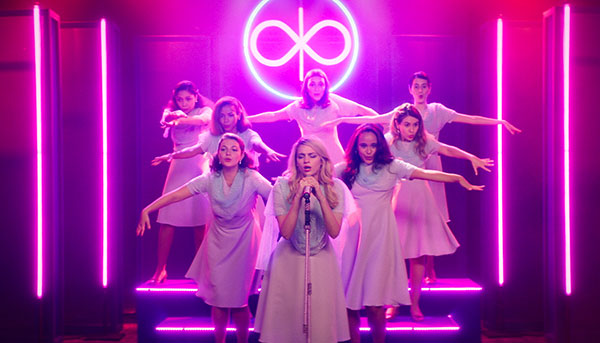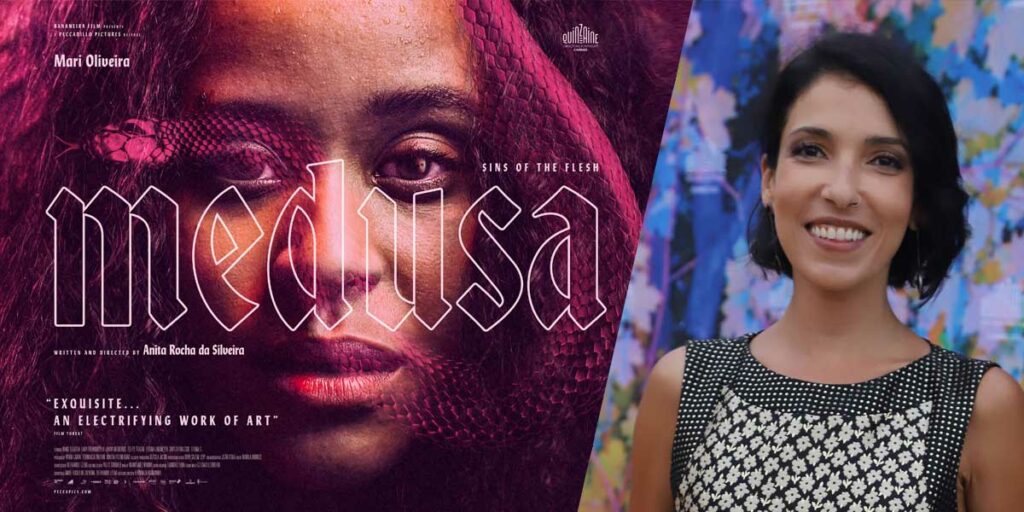We sit down with director/writer Anita Rocha da Silveira for an interview to discuss Medusa, her mind-bending, visually rich film influenced by the famous Greek myth.
In Anita Rocha da Silveira’s second feature film, Medusa, religious fanaticism and stifling masculinity run rife in Brazilian society. Set in an unnamed city and despite boasting futuristic, utopian tones alongside its depiction of the famous Greek myth, Medusa is a film very much made in and for the modern day.
After being attacked and left with a facial scar, Mari (Mari Oliveira) begins to see the world for how it really is: oppressive and overtly masculine. As her confusion and rebellion against this world grows, it spreads to other young women close to her. At the start of Medusa, these women moonlight as vigilantes, punishing other females for sinful acts, but the true ugliness of this clouded, warped vision of purity that they follow slowly becomes clearer. Da Silveira slowly peels back the layers of this corrupted society with startling results.
This fierce feminist film is one of the most memorable Brazilian releases of recent years, with spellbinding visuals, dense thematic and societal commentaries, and thought-provoking surrealism. Da Silveira drew heavily upon real aspects of her home country, and was also influenced by directors such as John Carpenter and Dario Argento. As Medusa was released in the UK, we sat down with da Silveira to discuss these various inspirations and influences, as well as the sensitively handled themes of feminism and misogyny. Read our interview with Anita Rocha da Silveira below.
THE MYTH: ANITA ROCHA DA SILVEIRA ON INSERTING MEDUSA INTO BRAZILIAN SOCIETY
When did the idea for Medusa form in your mind? Why did you choose this specific Greek myth?
Anita Rocha da Silveira: It was around 2015, and I came across a story in the news about a group of teenage girls who decided to beat up another girl at their school, because they considered her to be promiscuous. They tried to make her look ugly, cutting her face and hair. And then I came across other similar stories, in different neighbourhoods.
It reminded me of the original Medusa myth. She was a priest at a temple, and in different versions of the myth, she was either raped or had sex. She was no longer a virgin, which transformed her into this creature. I started to think about how this myth from so long ago still resonated with Brazilian society.
I also wanted to write characters that were different from myself, to get in the mind of a woman who grew up in very conservative environments. What do they think? We did a lot of research not only into the evangelical world, but also into the lives of right wing and conservative influencers and YouTubers.

How was the film received in Brazil?
ARS: After Cannes, we went to a lot of festivals in Brazil, but Medusa was only released there commercially this year. For the ultra-right, conservative people, they don’t go to the cinema. They consider filmmakers deviants. They only watch one TV channel; it’s like a completely different universe.
PAST, PRESENT, FUTURE: ANITA ROCHA DA SILVEIRA ON THE TONE AND VISUALS OF MEDUSA
There is a futuristic, utopian vibe to Medusa, but it is steeped in realism in terms of Brazilian culture and society. How did you balance between these two tones and settings?
Anita Rocha da Silveira: When I started writing Medusa, it was set in the future, but things in Brazil got worse and worse, so I decided to move it to a more parallel universe. The city of the film doesn’t actually exist. It is fictitious. We started shooting in Rio de Janeiro in fact, but because of budget issues we had to change. However, the church in Medusa is very realistic, as is everything the minister says. It’s inspired by real life speeches. Meanwhile, the crazier, more fantastical parts of the film take place in the hospital.
Did any filmmakers influence you when making Medusa? I noticed a lot of similarities to John Carpenter.
ARS: Definitely Carpenter, and also Dario Argento. A lot of the exaggerated tones of the film were influenced by films from the 1970s.
Could you talk about the thought process behind the visuals of Medusa? They are so important to the plot and its symbolism.
ARS: From the very beginning, myself and João Atala [DOP on Medusa] really wanted to use colours on set and have this bold aesthetic. We didn’t want to add it in post-production, but have it live on set. The colour green is the colour of the snake, of nature, and it became the main colour of the film, alongside the opposition colour of red.
FEMINISM AND UNITY: ANITA ROCHA DA SILVEIRA ON MEDUSA’S THEMES
The women in Medusa are initially portrayed as vigilantes who attack other women in the street, but you then show a shift to their true status as victims within society. It makes for a very interesting dynamic. What was your thought process behind this structure?
Anita Rocha da Silveira: When people in Brazil see this ultra-right movement growing, one of their first reactions will be that it is impossible to have any sort of dialogue. You think of the type of environment that those people in that movement grow up in though: they only read one type of news; they have no access to other types of information. Sometimes, people see someone as a villain, but they don’t know what they were exposed to.
There was a very ultra-right YouTuber whose slogan referenced ending feminism. She suffered an attempted rape, and when she reported the man from the church, the only people who supported her were the left wing people and feminists. Now, she is completely changed. I think people can change, so it is important not to close the door or close down dialogue.
These churches repeat slogans so much that people will start to believe them. They offer them family, comfort, or things that the Catholic churches or the state can’t. They offer support to lonely people. We don’t know why these people are there, but they stay because the church makes them stay in this bubble. These people seem like villains, but it really depends.
Warning: the following question contains minor spoilers on the ending.
The ending of Medusa, when the women are running down the street shouting, is so memorable and cathartic. When did that scene form in your mind? How important was it to the conclusion of Medusa?
ARS: The first draft I wrote had a different, darker ending. After Dilma Rousseff’s impeachment in 2016, I realised I needed a happier ending.
I was reading a lot of facts about Medusa and a lot of texts from the feminist movements of the 1970s. They said that her scream was a scream of anger, not of fear. That symbolises the pain that women have been holding inside themselves. I started thinking about the script, and I wanted to show these characters release this pain that they were holding. I went back to the image of Medusa screaming, but made it contagious, passing from one person to another. It becomes a way for these women to release all these things from their bodies.
It was also important to highlight the union between them. They are not best friends, but they choose each other, not the patriarchy.
The characters of Mari [Mari Oliveira] and Michele are very interesting, both together and alone. How did you develop these characters? What was the process like for the two actors playing them?
ARS: For Mari, I already had Mari Oliveira in mind, as she was a secondary character in my first feature film, Mate-me Por Favor. When you think about Medusa, you think about someone with curly hair too. There is this thing within church about straightening your hair, for you to have a very federalised look. For the character of Mari, I tried to mark a transformation process within scenes, like the one above the sink. I wanted Mari’s process to be one of letting go, not overthinking, and permitting herself to do what she wants.
For Michele, she starts out as a villain, but we found out all of these other layers to her. Lara has a lot of experience on television, and I was so happy she agreed to do the film.
What future projects are you working on?
ARS: I am working on two projects. One is a bit more commercial, more based in horror. The other is more of a musical with autobiographical parts.
This interview has been edited for length and clarity.
Medusa was released in UK cinemas and on PVOD and ESVOD on 14th July, 2023. The film is also available to watch on digital and on demand in the US and select countries. Read our review of Medusa.

